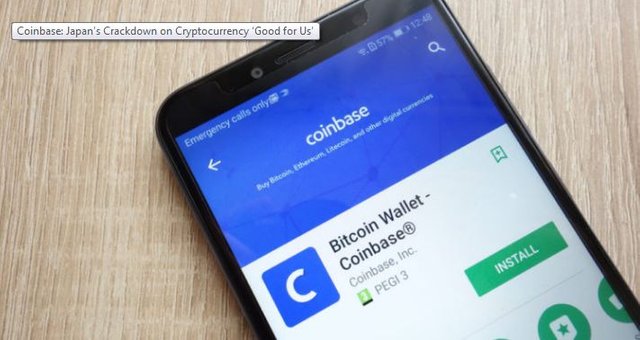Coinbase: Japan's Crackdown on Cryptocurrency 'Bravo
Digital currency trade monster Coinbase isn't worried that Japan's Financial Services Agency (FSA) has started to see the crypto exchanging industry with a more careful eye in the wake of a few prominent trade hacks on the administrative office's watch in 2018.
Talking with the Nikkei Asian Review, Mike Lempres, Coinbase's central approach officer, said that expanded examination of cryptographic money trades applying for virtual cash licenses is Japan was really something worth being thankful for the San Francisco-based organization since it would surrender them a leg on the opposition.
"The Japanese government is more centered around security," he said. "That is beneficial for us." Discussions with the FSA are "going admirably," he proceeded. "We are… focused on completing it. It will absolutely be in 2019."
That is a strong case, especially considering that, as Nikkei takes note of, the FSA has not affirmed a virtual cash permit since Dec. 2017, in the blink of an eye before Tokyo-based trade Coincheck was hacked for a record $530 million in Jan. 2018. A month ago, Osaka-headquartered exchanging stage Zaif lost $60 million after a hack and is currently attempting to remunerate clients.
Coinbase trusts those hacks, as opposed to make controllers and financial specialists reluctant to connect with the still-beginning digital money industry, will expand interest for firms with a reliable reputation.
"Japan has been a functioning extensive market from the earliest starting point, and has demonstrated strong as it ricochets once more from a few terrible encounters," Lempres said. "We think there is incredible interest for a confided in supplier of administrations here."
Lempres clarified that Coinbase dedicates much more assets to anchoring customer resources than numerous other digital currency trades, with "handfuls" of the association's 550 representatives working all day on resource security.
Undoubtedly, an ongoing profile in Wired point by point the lengths to which Coinbase goes to anchor digital money resources put away in its custodial "vault," spring up Faraday pens what not. Lempres additionally clarified that only one percent of the organization's assets are held in online "hot wallets," with the rest of the 99 percent anchored in chilly stockpiling. Additionally, those one percent of assets that are put away in Coinbase's hot wallet are completely protected.
Notwithstanding, however a worldwide organization with tasks in many nations, Coinbase's security device is focused in the U.S., which could prompt issues if the FSA says that it needs Coinbase Japan to physically store its advantages in Japan, where the office can all the more effortlessly screen them.
"We have everything worked to secure our capacity… in the U.S.," said Lempres. "We won't successfully even raise probability of a hack. It would be hard for us to copy what we do in the U.S. today in Japan and different nations."
CCN revealed in June that Coinbase was plotting a venture into Japan, with the trade administrator tapping previous Morgan Stanley Japan speculation financier Nao Kitazawa to fill in as CEO of Coinbase Japan.
"As in different markets, we intend to adopt a consider strategy to our rollout in Japan, which implies working as an inseparable unit with the Japanese FSA to guarantee consistence with neighborhood laws at each stage," the firm said at the time.
A week ago, reports rose that Tiger Global, a noteworthy U.K. multifaceted investments, was near finishing a $500 million interest in Coinbase. Different reports contrasted on whether the store was buying shares specifically from Coinbase or on the optional market, yet in one regard they all concurred: the speculation would esteem Coinbase at $8 billion, solidifying its status as one of the biggest digital money organizations as well as one of the world's most profitable secretly held tech organizations.
